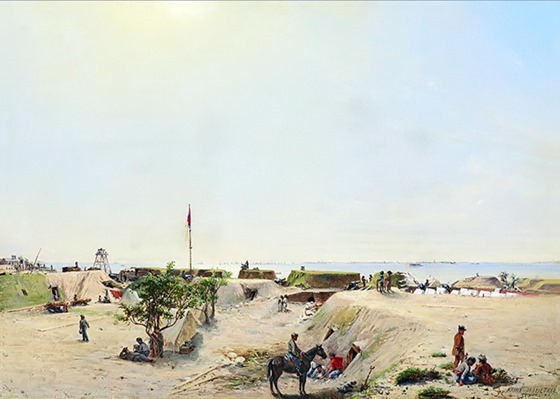September 16. At ten o’clock this morning the division marched southwest to the Rapidan river, soon coming in sight of the enemy on the high mountain ground on the left, contesting the advance of our cavalry force. Towards evening we witnessed a splendid artillery duel on the mountain side, under cover of which the enemy withdrew to the other side of the river; went into bivouac in the woods, a wretchedly swampy place.
Monday, September 16, 2013

“Towards evening we witnessed a splendid artillery duel on the mountain side…”–Diary of Josiah Marshall Favill.
Painting by Conrad Wise Chapman.
“Interior view of Fort moultrie while the fortifications are being built. Shows the old Moultrie house, Battery Beauregard, and Battery Marion. Lieutenant Martin is on a horse belonging to Col. Tabb of the 59th Va. Regt.” – Conrad Wise Chapman, 1898
by John Beauchamp Jones
SEPTEMBER 16TH.—The enemy advanced yesterday, and, our forces being unequal in numbers, captured Culpepper C. H. Our cavalry fell back several miles, and a battle is looked for immediately, near Orange C. H., where Gen. Lee awaits the foe in an advantageous position.
From the Southwest also a battle is momentarily looked for. If the enemy be beaten in these battles, they will suffer more by defeat than we would.
Gov. Vance has written a pointed letter to the President in regard to the mob violence in Raleigh. He says, when the office of the Standard was sacked, the evil was partially counterbalanced by the sacking of the Journal,—the first, moderate Union, the last, ultra-secessionist. He demands the punishment of the officers present and consenting to the assault on the Standard office, part of a Georgia brigade, and avers that another such outrage will bring back the North Carolina troops from the army for the defense of their State.
From Morton, Miss., Gen. Hardee says, after sending reinforcements to Bragg, only three brigades of infantry remain in his department. Upon this the President made the following indorsement and sent it to the Secretary of War:
“The danger to Atlanta has probably passed.”
While the army of Gen. Taylor threatens the southwestern part of Louisiana, troops will not probably leave New Orleans. The movement to White River is more serious at this time than the preparations against Mobile.
“Efforts should be made to prevent the navigation of the Mississippi by commercial steamers, and especially to sink transports.” [click to continue…]
September 16.—The rebel steamer Lizzie Davis, from Havana, for Mobile, Ala,, was captured in latitude 25° 58′ north, longitude 85° 11′ west, by the National flag-ship San Jacinto.—The rebel forces made an attempt to recross the Rapid Ann River, but were foiled by the National artillery and cavalry. They advanced in three columns, with artillery, toward the river, but being opposed by the Union troops on the north side, soon fell back.—A spirited skirmish took place at White Plains, Va., in which the rebels were dispersed in disorder.
September 16—To-day there was a man shot for desertion. Eight balls passed through him. The way this is conducted is: the brigade that he belongs to, or sometimes even the division, is drawn up in full sight of the doomed man. He is tied to a stake in front of his grave, which is already dug, and his coffin at his side. There is a squad of twelve men and one officer detailed to do the shooting. Eleven of the guns are loaded. The guns are given to them by the officer, so that no man knows which gun is loaded. The order is then given to fire. Thus ends the deserter’s life. The brigade, or division, then marches around him, so that every man can see his, the deserter’s, end.





